Publicaties

The EU Conflict Minerals Regulation: High stakes, disappointing results
The EU Regulation on the responsible supply of tin, tungsten, tantalum and gold (3TG) originating from conflict-affected and high-risk areas (CAHRAs) came into full force on 1 January 2021. Also known as the “Conflict Minerals” or “Responsible Minerals” Regulation, it aims to break the link between the exploitation and trade in 3TG on the one hand, and conflict financing on the othe
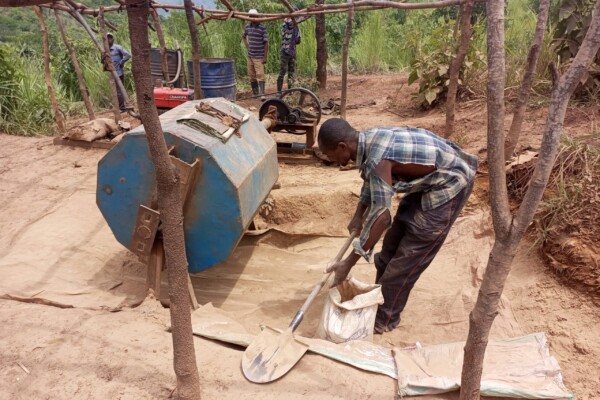
Securing insecurity: Semi-industrial gold mining and violence in Mwenga, South Kivu, Democratic Republic of Congo
- Claude Iguma Wakenge, Ken Matthysen | 5 oktober 2023
Since 2011, gradual introduction of novel mining equipment such as crushing mills has led to the increasing mechanization of artisanal gold mining operations in Mwenga territory (South Kivu), including the arrival of semi-industrial mining companies. This report is part of a USAID-funded project examining the linkage between armed conflict, insecurity and natural resource exploitation in the easte

International standards to prevent police gun violence
- Brian Wood | 29 september 2023
In many countries, the global and regional proliferation of small arms means that police and other law enforcers are under extreme pressure to counter rising levels of violent gun crime, and are expected to confront armed offenders. In the process, ill-trained and ill-disciplined officers with guns, sometimes kill, maim, and mistreat innocent people whom they are supposed to protect. Increasingly,
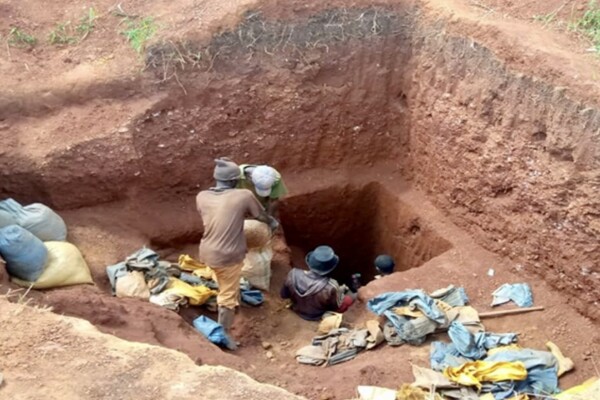
Voix du Congo: The role of artisanal mining in the demobilisation and reintegration of former FPRI fighters in the chefferie de Walendu Bindi, Ituri
- Pascal Takaibone, Réseau Haki Na Amani (RHA) | 22 september 2023
See our series: VOIX DU CONGO Located in the north-east of the Democratic Republic of Congo, the province of Ituri has experienced almost two decades of activism by the armed group Force de Résistance Patriotique de l’Ituri (FRPI). The failure of a demobilisation, disarmament and reintegration (DDR) programme launched in 2020 has led FRPI fighters to informally return to public life, finding
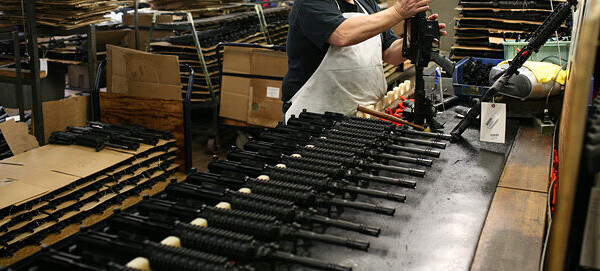
Due diligence responsibilities of businesses involved in small arms and light weapons
- Markus Fahlbusch | 18 september 2023
IPIS and the International Action Network on Small Arms (IANSA) have developed a Fact sheet on “Due Diligence Responsibilities of Businesses Involved in Small Arms and Light Weapons.” For over a decade, the international community has been developing guidelines for responsible business conduct for States and companies to prevent, address and remedy human rights abuses committed in business operati
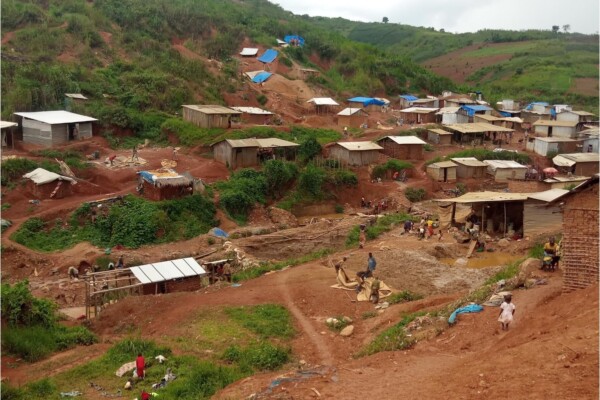
Armed groups, territorial control, land disputes, and gold exploitation in Djugu, Ituri, Democratic Republic of Congo
- Erik Gobbers, Josaphat Musamba | 10 augustus 2023
In late 2017, almost fifteen years after the end of the second Congo war, and after several years of relative peaceful coexistence, inter-communal tensions flared up once again in Ituri province, in eastern Democratic Republic of Congo (DRC). In December 2017, isolated violent incidents between members of the Hema and Lendu communities provoked an escalation and heralded the beginning of a new cyc
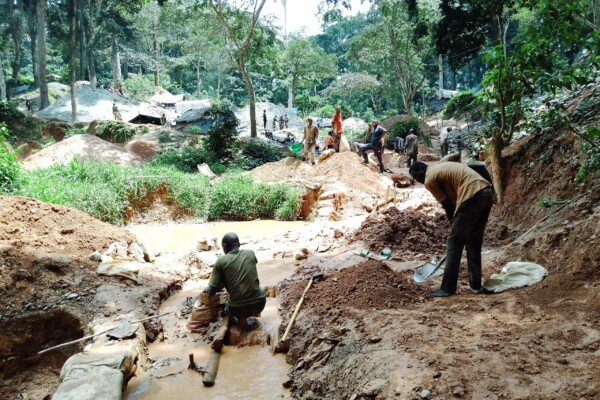
Annual Report 2022
- IPIS | 26 juni 2023
In 2022 IPIS continued its work throughout the gradual wind-down of the COVID pandemic and the outbreak of war in Ukraine. Throughout a turbulent year for civil society actors committed to peace, disarmament, and international dialogue, IPIS remained steadfast. Continuing to develop strong relations with key donors and maintaining its commitment to delivering excellent work in investigating a
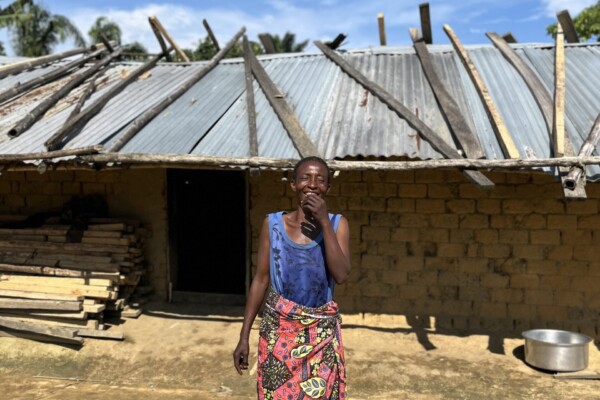
Unconditional Cash Transfers (UCT) in the DRC: Midline results of a pilot study in an artisanal mining zone in Maniema province
- Erik Gobbers, Thomas Muller | 19 juni 2023
In October 2021, the Belgian non-profit organization Eight World, started a pilot project of Unconditional Cash Transfers (UCT) in a village in an artisanal mining zone in the territory of Pangi, in Maniema Province, in the Democratic Republic of Congo (DRC). Eight World transfers cash directly to individual beneficiaries via a mobile money system. Each adult living in the UCT village receives 20
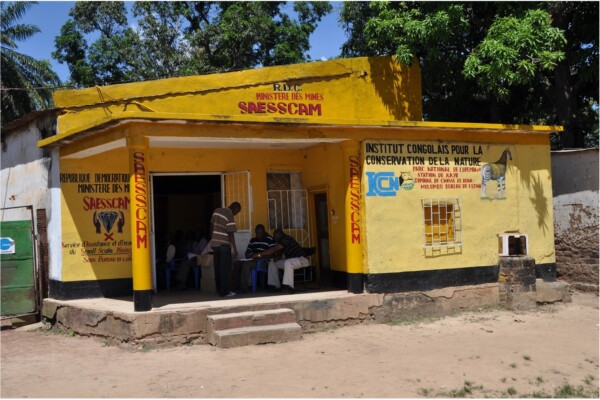
Taxes and levies in the artisanal mining sites of South Kivu and Ituri: How much does an artisanal miner pay?
- Guillaume de Brier, Jean-Paul Lonema (IMPACT), Thomas Muller | 14 april 2023
This report is the result of a large-scale field study on taxation in the artisanal mining sector in the eastern Congolese provinces of Ituri and South Kivu. The main finding is that current regulations and practices in the field not only cause mineral smuggling, which leaves some of the sector’s fiscal potential untapped at the provincial and national levels, but also constitute a source of insec
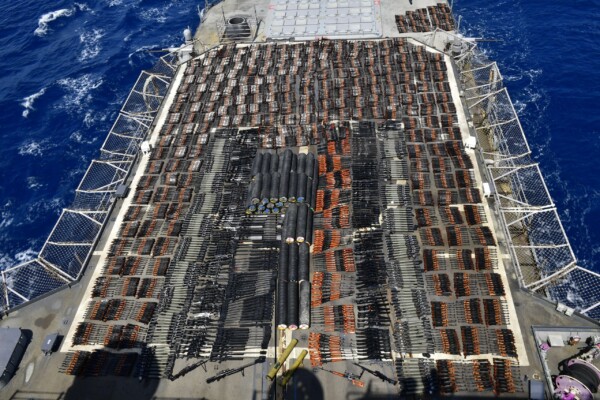
A human rights perspective on arms export licencing and access to information
- Hans Lammerant (Vredesactie) | 6 februari 2023
Arms export licensing has long been dominated by two rationales: an interstate perspective and intrastate perspective. In the former arms licensing enables trust-building between nations while the latter increases government accountability. A human rights perspective is overdue in arms export licensing. Victims and their defenders should be able to pursue effective remedy when harm is in
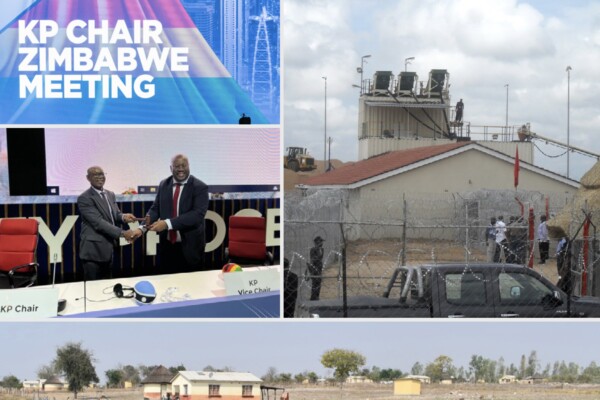
From laggard to leader? Zimbabwe’s turbulent diamond history
- Hans Merket, Jonatan Weenink | 31 januari 2023
This IPIS Insight provides background and context to Zimbabwe’s current Kimberley Process chairmanship, both historically and in light of whether it might present opportunities for government and corporate actors in the country to exorcise their demons.
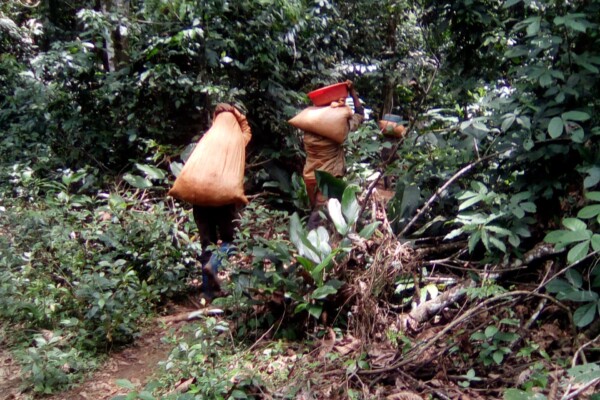
Armed conflict, insecurity, and mining in eastern DRC: reflections on the nexus between natural resources and armed conflict
- Erik Gobbers, Ken Matthysen | 7 december 2022
This report offers a new framework for looking at the eastern Congo conflict, one within which new evolutions of the past twenty years find a place. Indeed, violent conflict in eastern Congo has changed dramatically in all its aspects over the past two decades. Yet too often policymakers and observers appear to assume that we are dealing with a proxy war orchestrated from the DRC’s eastern neighbo
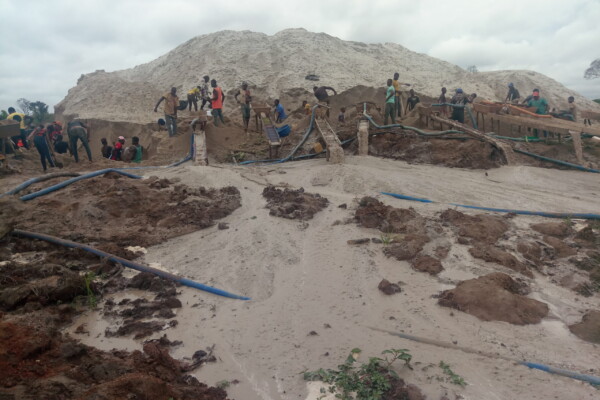
Analysis of the interactive map of artisanal mining areas in eastern Democratic Republic of Congo – 2022 update
- Ken Matthysen, Ntakobajira Zacharie Bulakali, Thomas Muller | 29 november 2022
In eastern Democratic Republic of Congo (DRC), the artisanal and small-scale mining (ASM) sector plays an important role in the local economy. While large-scale armed conflict over DRC’s mineral wealth has decreased significantly over the past twenty years, armed actors continuously interfere in the mining sector, and conflicts over resources at the local level are still common. Based on new minin
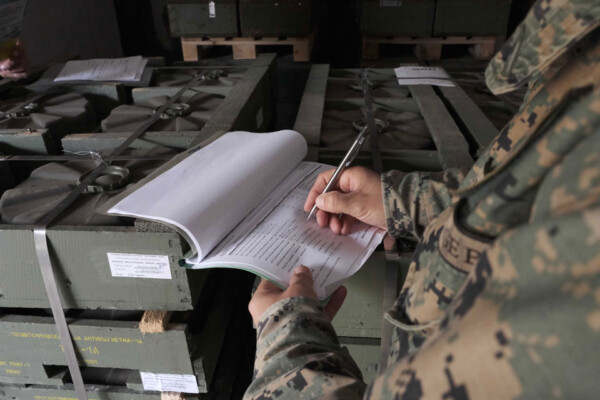
Post-shipment control of small arms and light weapons
- Markus Fahlbusch, Peter Danssaert | 24 oktober 2022
The illicit trade of small arms and light weapons (SALW) and their ammunition, parts and components remains a serious international problem in many States. To prevent the illicit trade in conventional weapons and to prevent their diversion to the illicit market, all States have made commitments since 2001 to establish stronger systems that will ensure responsible control of arms transfers. A coher
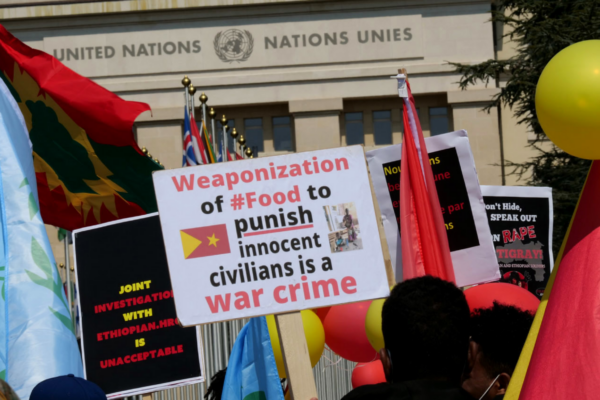
Famine as weapon of war – A timeline of the Tigray conflict
-
| 19 oktober 2022
In May 2021 CNN reported that Eritrean troops in coordination with the Ethiopian military were blocking aid deliveries to parts of Tigray not under Ethiopian government control. In an exclusive interview with Reuters a senior UN official alleged that starvation was being used as a weapon of war. U.N. humanitarian coordinator Mark Lowcock told Reuters that Eritrean forces were “trying to deal with
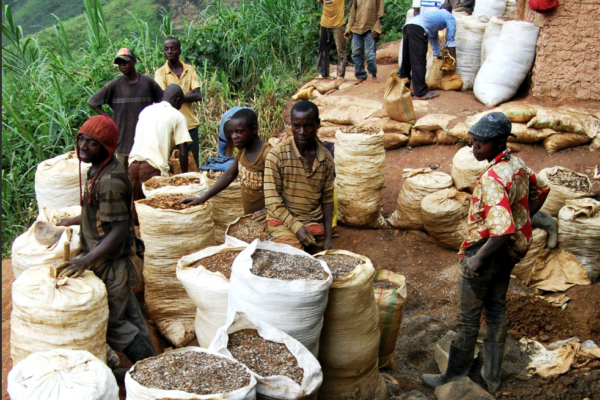
The European Regulation on Responsible Mineral Sourcing: what are the lessons learned so far?
The 1st of January 2021 marked the entry into force of the European Regulation on Responsible Sourcing of tin, tungsten tantalum and gold (3TG) from conflict-affected and high-risk areas (EU CMR or Regulation). The objective of the Regulation is to oblige European companies to carry out due diligence checks on their suppliers up-to the middle of the supply chain in order to minimize and manage the
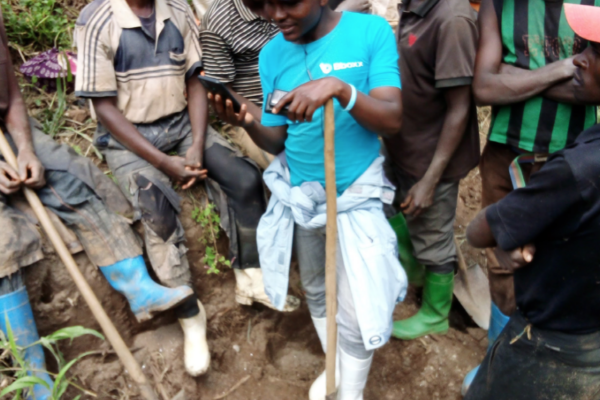
Matokeo – Data collection on ASM in eastern DRC
- Alexandre Jaillon, Ulula | 27 september 2022
‘Matokeo’ (meaning ‘impact’ in Swahili) is a data-driven platform operating in the Democratic Republic of Congo (DRC) with the ability to reach last mile artisanal miners, enabling them to ping the latest international price of gold. Conceptualized by Ulula and the International Peace Information Service (IPIS), the project won a Conservation X grant in October 2020 for its ability to remotely col
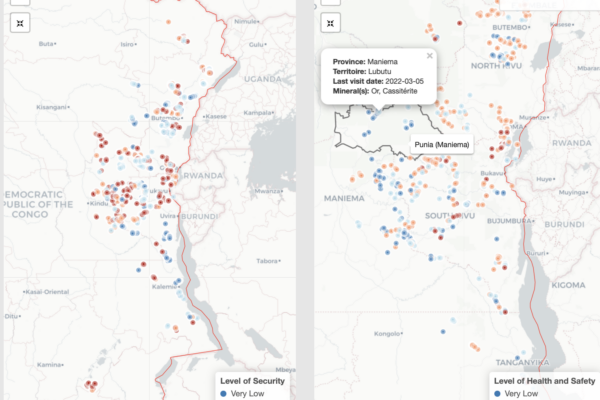
Responsible mining scorecard in eastern DRC
-
| 31 augustus 2022
Over the years, IPIS has systematically collected mine site and trade hub level data on artisanal and small-scale mining (ASM) in eastern DRC. This data collection has enabled IPIS to generate a sizable database of more than 3,000 ASM sites that draws both on sites visited by IPIS and data from third party sources including the Congolese mining cadastre and the Mini
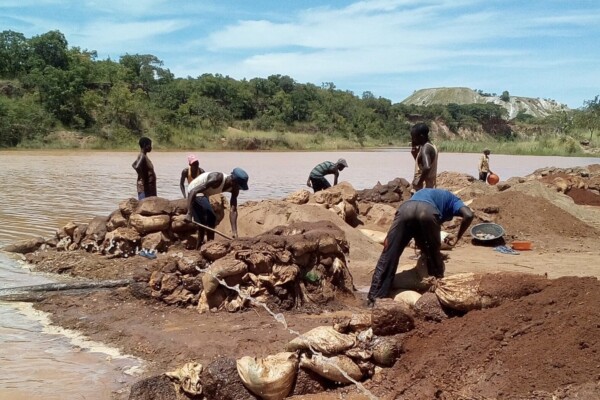
Annual Report 2021
- IPIS | 13 juli 2022
2021 has proven to be a fundamental year for IPIS. In the background of the global health crisis and its various impacts on partner organisations and multilateral frameworks, IPIS continued to fulfill its role in investigating armed conflict and human rights violations, addressing business practices, and being present in networks and platforms with information and advice. This annual report gives
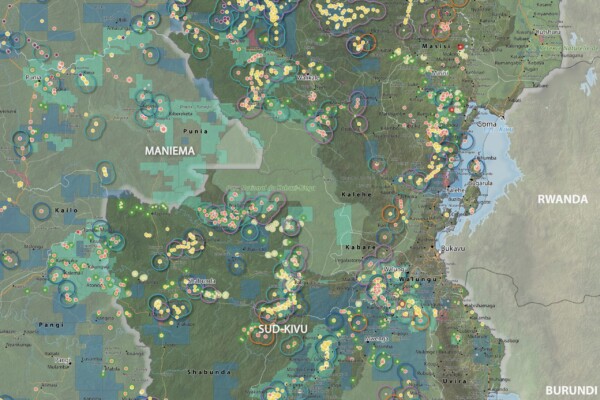
Maps of artisanal and small-scale mining in eastern DRC
-
| 4 juli 2022
IPIS has created large format maps of known past and present ASM sites in eastern DRC. These A0 maps cover the provinces of Haut Uele, Maniema, Ituri and North and South Kivu. Each map details the type of minerals, the qualification status by official authorities, the mining titles and provide with an overview of armed presence in and around the mines as reported during field visits conducted by I

